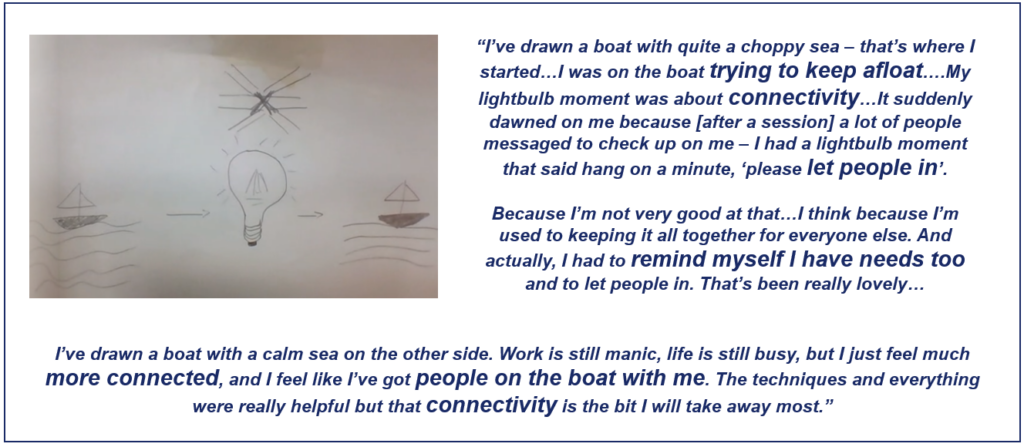As part of our programme of research with working families who are ‘just about managing’, we also engaged with our own employees who find themselves in this position.
Through a survey, focus groups and interviews with employees we found that there are many working parents within ECC who are feeling the pressures of juggling work and home life, and would benefit from some extra support. Employees also expressed a desire for more opportunities for peer support, and help with career progression.
These insights informed the development of a pilot for a small number of employees to participate in group sessions facilitated by a trained coach, which provided coaching tools and approaches in a supportive peer group environment.
The sessions provided a safe space for employees to reflect and learn together, with topics for each session such as managing your energy and building resilience, protecting your time and boundaries, and moving towards goals.
We were able to offer places on the programme to those who gave their time to talk to us as part of the research, and it was great to be able to ‘give something back’ after they had provided us with such valuable insights into life as a working parent at ECC.
Taking the time to listen and learn…
As with any pilot, evaluation was really important for us to measure the success of the programme and learn from the process, as this would be vital in informing decisions around expanding the offer.
We used some traditional evaluation methods such as baseline surveys to gauge where participants were ‘at’ before the programme, with comparisons at the end. But we were keen not to just save everything up until the very end, and wanted to take an iterative approach to capturing learning and feedback throughout.
We used feedback surveys after each module, and held a focus group style ‘check in’ session with participants after their first group session. With a small cohort of 8 employees we were able to take a more personal approach, and provided plenty of opportunities for participants to feedback and be part of shaping the programme so that they could get the most out of it.
Taking an agile approach, we were able to implement some suggestions straight away. A couple of ideas from the check-in session were the concepts of ‘buddying’ participants up, and adding a ‘buffer time’ before and after the group sessions, to give participants some protected time in diaries to reflect and get into the right headspace for the session.
Very simple additions to the programme, but hugely valued by the participants who appreciated the extra time and reported getting a lot out of the additional peer support.
My buddy and I are going to stay in contact to allow us points to stop and reflect and check in on how each other are doing. I want what I've learned to become part of my normal working/thinking, so I think these reflection points will help embed my learnings into my routine.
We held a final feedback session at the end of the programme to capture qualitative insight, and even got a bit creative by asking participants to draw a picture which represents their experience. This was a really insightful session and it was clear all participants had been on an emotional journey, and all took something away from the experience.

Most importantly, it helped us to better understand the key impacts of the programme, and provided valuable learning to feed into the development of the second cohort.
This work highlighted the importance of evaluating well, and it was also really rewarding to be part of something which came full circle. From identifying employees’ needs within the research, to implementing a programme of support and seeing employees benefitting from this, as well as helping to inform the future offer for others.
We have just completed a second cohort on the pilot and we are continuing to learn as we go, with employees’ experiences at the centre.